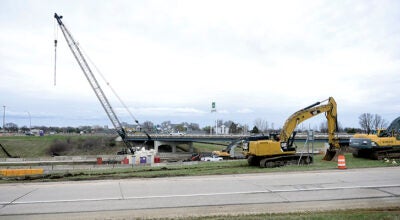Building for the future; Austin Housing Initiative offers incentive to build
Published 5:11 am Thursday, October 27, 2016
It’s a good time to build a home in Austin and Mower County.
Earlier this year, the Austin City Council, Austin Public School Board and Mower County Board of Commissioners all voted to support the Austin Housing Initiative, a five-year abatement of new taxes from residential construction available to builders who apply through 2019.
To date, the future homeowners receiving the credit have given the program rave reviews.
“I think it’s a good thing to encourage construction and building,” said Scott Fox, who received abatements from the county, city of Austin and Austin Public Schools to build a single-family home on 29th Avenue Northeast estimated to cost between $450,000-$500,000.
After a strong start to the program, community leader are looking to keep getting the word out on a program as winter approaches and an important spring building season awaits in 2017.
“I think it kicked off really well,” According to City Administrator Craig Clark said.
The incentive was brought forward by the city of Austin earlier this year when its housing committee suggested it as a way to address the shortage of housing for its workforce. The program is designed to attract more housing development in the community.
Clark said six new homes were built in Austin in 2015. In four years, it is estimated, Austin will need another 300 rental units and 118 single family or townhome units. The Austin Housing Initiative is patterned after a program in use in Nobles County.
Austin’s seen an average of nine housing projects starting per year in the last five year, but Clark noted that’s not sufficient for Austin to grow.
“That’s not sufficient to keep pace even with our aging housing stock,” he said.
Clark said something needed to be done to keep up as homes age and deteriorate.
“Standing by and doing nothing wasn’t an option,” he said.
‘A good program’
The city has already approved a few applications with another on the agenda at its next meeting, while the school board has approved four and Mower County has approved five with two more scheduled — including one duplex being built by a developer.
But it’s more than the number of homes being built. Clark noted the homes being built are coming at a high value of $250,000 to $500,000.
“Those are significant homes that obviously will be there for a long time past the five years of tax abatement,” Clark said.
Plus, Clark noted some builders are Austin residents moving up to a higher value home and are therefore putting their current homes on the market for buyers.
Austin Housing and Redevelopment Authority Executive Director Jon Erichson agreed the program has already generated interest, as a few people building admitted they were originally looking to build in Rochester or Albert Lea but were coaxed here by the abatement.
“I know it’s made a difference already,” Erichson said.
Along with Mower County, the city and school board, some of the small towns and townships have also followed suit in approving an abatement or agreeing to discuss them on a case-by-case basis.
LeRoy approved the abatement, and Henry and Richianne Burger were one couple to seek it from the city of LeRoy and Mower County.
“Knowing what you people are trying to accomplish, I think it’s an extremely good thing,” Henry told the county board. “Somehow I think the word needs to get out a little more
He urged the county to reach out to people working and living in places like Owatonna and Rochester and neighboring communities to consider building in Mower County.
“We need to get the word out more,” he added. “It is a good program.”
Critics
But the program has garnered criticism.
Mower County Commissioners Jerry Reinartz and Tony Bennett voted no in the initial vote to support the program.
Reinartz argued the plan unfairly backs new construction and does nothing to help landlords address blighted properties.
Bennett argued this will be a tax shift and will increase the burden on other taxpayers during the abatement years, calling it a shift for people building expensive homes.
Bennett has since voted in favor of individual projects, while Reinartz has voted against each one.
Reinartz questioned if Austin really has a demand for housing projects.
“To me, it’s more of an economic issue,” Reinartz said. “If there was a real demand like they say there is for housing, and they were saying Austin has a housing shortage. Interest rates are low, money’s easy to get. Why aren’t these developers building homes if there’s a demand for housing. I don’t think there is.”
Reinartz argued if there was a housing shortage and a chance to make a profit, people would be building.
“Builders would be building homes if there was a demand, and there hasn’t been any demand,” Reinartz said. “There hasn’t been any demand.”
To Reinartz, the problem lies with economics.
“It’s a stagnant economy,” he said. “Austin is not growing. It’s holding it’s own. But you need some reason for people to be building homes other than to be getting free taxes.”
But Erichson assured indeed needs more housing, but he noted people have become more and more mobile and think little to nothing of driving further to work by building in another community.
“I think the housing need is there, we’re just trying to create it in Austin or Mower County,” Erichson said.
Clark added the city had no other alternative than to take some kind of action.
“We need to do something to spur housing,” Clark said.
Reinartz and commissioners has also discussed the need for programs to help residents to address blighted properties; however, those are more complicated.
While the abatement is viewed as a way of increasing the community’s tax capacity long term, it’s more difficult to produce tax value from improvement projects.
Moving ahead
After a strong start, Clark noted the city could advertise the program more in spring when it’s closer to the construction season.
But to date he’s pleased with the program’s progress.
“We’re off on the right foot, I think,” Clark said.
The Austin Housing and Redevelopment Authority is helping facilitate and organize the program, and it will help residents streamline the state-required public hearings for the abatement with the city, county and school district. Each home needs individual approval after the hearing to received the abatement. People interested in the abatement can call the HRA at 507-433-1866.






